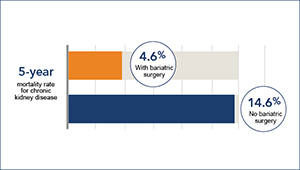Obesity
Research overview
“Obesity is the number-one health problem in the United States because it negatively affects our population’s health more than any other condition,” said Kaiser Permanente Washington Health Research Institute Senior Investigator David Arterburn, MD, MPH. Kaiser Permanente Washington researchers are doing practical research to learn how doctors, patients, families, employers, and policymakers can best work together to prevent and treat obesity.
“We’re focusing on three ways to halt the obesity epidemic,” said Senior Investigator Dori Rosenberg, PhD, MPH. “We’re helping to change obesity-promoting environments, bringing evidence-based prevention and treatment programs into health care systems, and helping people develop lifelong healthy diet and activity habits.”
Kaiser Permanente Washington obesity research areas include:
- reducing sedentary behavior and promoting physical activity and healthy diet in various age groups, populations with chronic conditions, and families;
- shared decision making to help patients find the best way to a healthy weight;
- implementing health coaches in primary care to support behavior changes;
- social networks that support lifestyle change programs;
- relationships between medications and genetic factors in developing obesity;
- health system, community, and national policies that address obesity;
- relationships between obesity and depression, diabetes, and other conditions; and
- long-term benefits and risks of bariatric (weight loss) surgery.
“Obesity is caused by many factors, so at Kaiser Permanente Washington, we’re working on many levels,” said Paula Lozano, MD, MPH, a senior investigator and Kaiser Permanente Washington’s assistant medical director for preventive care. “We’re improving health care to help people who are obese now. But since obesity is a societal problem, we’re also studying how to change our homes and workplaces and neighborhoods to create more healthy environments.”
Recent publications on Obesity
Cheadle A, Atiedu A, Rauzon S, Schwartz PM, Keene L, Davoudi M, Spring R, Molina M, Lee L, Boyle K, Williamson D, Steimberg C, Tinajero R, Ravel J, Nudelman J, Azuma AM, Kuo ES, Solomon L A Community-Level Initiative to Prevent Obesity: Results From Kaiser Permanente's Healthy Eating Active Living Zones Initiative in California 2018 May;54(5 Suppl 2):S150-S159. doi: 10.1016/j.amepre.2018.01.024. PubMed
Takemoto M, Lewars B, Hurst S, Crist K, Nebeker C, Madanat H, Nichols J, Rosenberg DE, Kerr J Participants' Perceptions on the Use of Wearable Devices to Reduce Sitting Time: Qualitative Analysis 2018 Mar 31;6(3):e73. doi: 10.2196/mhealth.7857. Epub 2018-03-31. PubMed
Young DR, Fischer H, Arterburn D, Bessesen D, Cromwell L, Daley MF, Desai J, Ferrara A, Fitzpatrick SL, Horberg MA, Koebnick C, Nau CL, Oshiro C, Waitzfelder B, Yamamoto A Associations of overweight/obesity and socioeconomic status with hypertension prevalence across racial and ethnic groups 2018 Mar;20(3):532-540. doi: 10.1111/jch.13217. Epub 2018-02-12. PubMed
Rosenberg DE, Lee AK, Anderson M, Renz A, Matson TE, Kerr J, Arterburn D, McClure JB Reducing Sedentary Time for Obese Older Adults: Protocol for a Randomized Controlled Trial 2018 Feb 12;7(2):e23. doi: 10.2196/resprot.8883. Epub 2018-02-12. PubMed
Drewnowski A, Buszkiewicz J, Aggarwal A, Cook A, Moudon AV A new method to visualize obesity prevalence in Seattle-King County at the census block level 2018 Feb;4(1):14-19. doi: 10.1002/osp4.144. Epub 2017-12-28. PubMed
Researchers in Obesity
 David E. Arterburn, MD, MPHSenior Investigator |
 Allen Cheadle, PhDSenior Investigator, KPWHRI; Senior Research Associate, CCHE |
 Andrea J. Cook, PhDSenior Biostatistics Investigator |
 Maricela Cruz, PhDAssociate Biostatistics Investigator |
 Nicole M. Gatto, PhD, MPHPrincipal Collaborative Scientist |
 Beverly B. Green, MD, MPHSenior Investigator |
 Mikael Anne Greenwood-Hickman, MPHSenior Collaborative Scientist |
 Paula Lozano, MD, MPHSenior Investigator; Director, ACT Center |
 Dori E. Rosenberg, PhD, MPHSenior Investigator |
 Gregory E. Simon, MD, MPHSenior Investigator |











